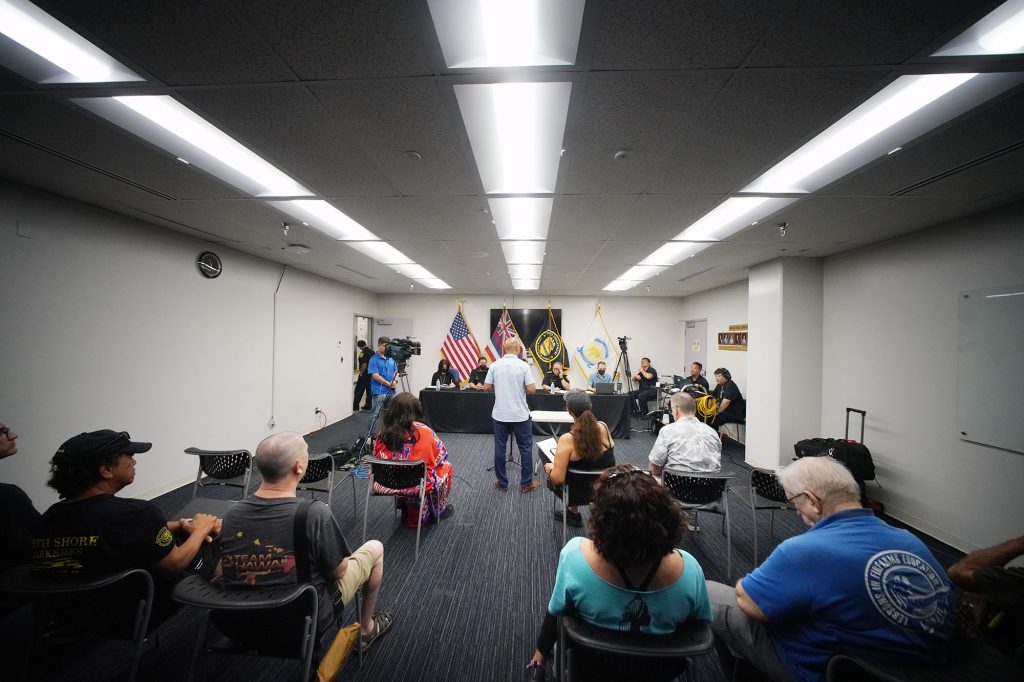Hawaii House And Senate Give Nod To Sweeping Tax Relief Bill
Lawmakers agreed to double tax credits for working families, limit guns in sensitive places and tax e-cigarettes but failed to reach consensus on HTA.
Lawmakers agreed to double tax credits for working families, limit guns in sensitive places and tax e-cigarettes but failed to reach consensus on HTA.
A potentially far-reaching tax bill aimed at reducing the burden on Hawaii’s working families advanced Friday after House and Senate negotiators agreed on the details, but leading lawmakers refused to discuss the bill or disclose its contents after the vote.
Senate Ways and Means Committee Chairman Donovan Del Cruz declined to tell reporters what was in the measure or provide a copy of the final draft, and House Finance Chairman Kyle Yamashita also brushed off reporters’ questions about .
Yamashita said a press release would be issued later, but would not say when. Hours later, Yamashita again refused to discuss the contents of the bill after a House floor session.
House Speaker Scott Saiki finally disclosed details of the package Friday evening, explaining that the centerpiece of the agreed-upon tax package are provisions that will double the state earned income tax credit that can be claimed by low-income families.

The final measure will also double the food tax credit offered to low-income residents to partially offset the impact of the state excise tax on food, and more than double the child and dependent care tax credit, Saiki said.
Ratcheting up those tax credits “will absolutely help working families,” Saiki said.
However, the final draft of the tax bill does not include adjustments to state income tax brackets, standard deductions and exemptions that were sought by Gov. Josh Green. Saiki said the proposed changes to the income tax structure proved to be too complicated, and were excluded.
“Bracket changes are complicated, so they have to be really thought out,” Saiki said. “You can’t just make up numbers when it comes to brackets, so that requires some further review.”
Green had proposed significant income tax changes as part of a larger tax relief package he unveiled in his State of the State speech this year.
The governor’s original package of proposed tax credits and income tax relief would have cost the state more than $300 million per year in lost tax collections. Green has argued residents are struggling with the high cost of living and need relief.
Meanwhile, negotiations between the House and Senate over the future of the Hawaii Tourism Authority collapsed on Friday.
No Consensus On HTA
Earlier in the session the House and Senate had both tentatively approved measures that would have abolished the authority and replaced it with a new tourism promotion and management agency under the Department of Business, Economic Development and Tourism.
However, bargaining between the House and Senate over that plan bogged down as Friday’s deadline approached to finalize all bills for this year’s legislative session.
Sen. Lynn DeCoite, chairwoman of the Senate Energy, Economic Development and Tourism Committee, issued a statement shortly after 4 p.m. Friday explaining that “unfortunately, we could not reach a consensus” on .
“During negotiations, the Senate proposed that the Hawaii Tourism Authority (HTA) continue to exist with a reduced governing board consisting of only nine members and a primary focus on marketing and promoting tourism,” DeCoite said in her statement.
The Senate also proposed a separate Office of Destination Management under DBEDT “to engage and involve local communities in destination management planning, which would provide valuable insight and feedback to help guide the state’s overall tourism strategy,” she wrote.
In the past HTA has received $60 million a year or more in state funding to market Hawaii nationally and internationally, and to support the Hawaii Convention Center. The authority’s mission statement also includes perpetuating the Hawaiian culture and preserving Hawaii’s natural environment.
But former Gov. David Ige vetoed $60 million in funding for HTA last year, saying his administration would fund the agency with federal money.
Now HTA faces new budget problems because the authority was reportedly excluded from the new state budget that lawmakers are scheduled to vote on next week.
John De Fries, president and CEO of HTA, said those circumstances mean “our work in holistic, integrated destination management, visitor education, and brand marketing is in jeopardy.”
“We appreciate the Legislature’s appropriation to repair the ±á˛ą·É˛ąľ±Ę»ľ± Convention Center roof, and with adjustments to current contracts, we will have funds to keep the lights on and retain our staff of 22,” De Fries said in a written statement.
“Our leadership team and board of directors will be making tough decisions in the coming days about cancelling active procurements, existing contracts, and ongoing community work,” he wrote.
DeCoite said she is confident the agency can continue to operate with about $30 million in unspent federal pandemic relief money.
“I am eager to have further discussions on this crucial issue with HTA and our legislative colleagues in the next legislative session,” she wrote.
Negotiated Raises
Another House-Senate committee gave tentative approval Friday to , which would provide $187 million over the next two years for negotiated raises for unionized public school teachers as well as some employees who are excluded from collective bargaining.
The new package of pay increases and benefits negotiated for the teachers is expected to cost $577 million over four years.
The measures go to a full vote by the House and Senate next week.
Sensitive Places For Guns
Lawmakers also reconciled House and Senate versions of a bill that would ban guns in a range of locations like parks and shopping centers.
is in response to a U.S. Supreme Court , when the court ruled against New York state’s strict licensure requirements for concealed carry of firearms. Specifically, it said New York’s requirement that concealed carry applicants demonstrate “proper cause” was too demanding and too subjective.
This was a seismic decision. Several states, including Hawaii, had been using similar laws to regulate who may and who may not carry a gun in public. Those discretionary laws now don’t apply.
But the state does retain a lever of power. While it can’t as thoroughly restrict who can own a gun, it can still restrict where guns can be present.

These locations are often referred to as “sensitive places.” The court rejects the idea that an entire cityscape – like the island of Manhattan – could fall under that designation, but plenty of options remain that are smaller than that.
Sensitive places under SB 1230 include, among others: government buildings; medical facilities; correctional centers; bars or restaurants that serve alcohol; stadiums, arenas, and concert halls; public libraries; grade schools and higher education campuses; beaches, playgrounds and parks; shelters for homeless people or victims of domestic violence; public transportation; banks; polling centers; large gatherings like protests or parades; and amusement parks, museums, carnivals and zoos.
Firearms are also banned in privately owned establishments unless the owner or manager gives explicit authorization.
Testimony isn’t accepted during conference committee, but during the last regular hearing, director Andrew Namiki Roberts of the Hawaii Firearms Coalition to this long list of sensitive places.
Sensitive places “should be limited in scope to those areas that are truly sensitive and where the government can, with 100% certainty, provide safety for those under its care. These places would include schools and government buildings,” he wrote.
There will likely be court challenges. After the Supreme Court’s decision, New York state passed a sensitive places bill, against which New York gun owners filed a lawsuit. The Supreme Court is allowing the bill to in the meantime, according to a January report from The Associated Press.
“We believe these provisions are legally appropriate and are grounded in longstanding history and tradition,” Hawaii Attorney General Anne Lopez wrote in supportive testimony.
A similar bill was passed by the City and County of Honolulu in March, and it will take effect on Monday.
Years In The Making
Two bills successfully advanced after years of advocacy.
Lawmakers from the House and Senate agreed on how to tax electronic cigarettes in response to the growing public health concern over young people using them.
Electronic smoking devices and their e-liquids are now set to fall under the definition of “tobacco products,” and this agreed-upon version taxes these products in parity with cigarettes at 70%.
The agreement came as a surprise. Bills to curb vaping have a troubled history at the Capitol, with last year’s bill to ban flavored e-cigarettes ultimately vetoed by then-Gov. David Ige because of a loophole that was added.
On Tuesday, as House and Senate conferees negotiated a final version of this year’s , a clear rift came up between conference chairs Sen. Joy San Buenaventura and Rep. Della Au Belatti.
The chambers generally agreed on raising the licensing and retail fees, but the House side was noncommittal about raising the tax to be in line with other tobacco products.
“What happened with the vaping ban last session, the advocates were not happy with a compromise position. And that’s the reason we want parity this year,” San Buenaventura

That parity came late Friday afternoon, during a in a crowded third floor conference room at the Capitol.
Sen. Stanley Chang’s signature cause ALOHA Homes also advanced. The proposal is in response to Hawaii’s housing crisis, and is one that Chang modeled after Singapore’s state-owned housing system.
Chang has tried to pass a version of the bill since 2019. This iteration, , is the most successful yet. It stipulates that one housing project can be built, geared toward owner-occupied, 99-year leases for Hawaii residents.
A developer will foot the cost of construction, while the state will provide non-ceded land near the rail system in line with transit-oriented development.
This final version of the bill still needs to clear full chambers in the House and Senate next week before reaching the governor’s desk.
“We’re cautiously optimistic,” said Chang, who gave kudos to Rep. Troy Hashimoto for his work on the bill too.
“It’s a big milestone though, because this concept has never gotten to this point before,” Chang said.
 Sign up for our FREE morning newsletter and face each day more informed.
Sign up for our FREE morning newsletter and face each day more informed.
We need your help.
Unfortunately, being named a finalist for a Pulitzer prize doesn’t make us immune to financial pressures. The fact is, our revenue hasn’t kept pace with our need to grow,Ěý.
Civil Beat is a nonprofit, reader-supported newsroom based in ±á˛ą·É˛ąľ±Ę»ľ±. We’re looking to build a more resilient, diverse and deeply impactful media landscape, and we hope you’ll help by .
About the Authors
-

Kevin Dayton is a reporter for Civil Beat. You can reach him by email at kdayton@civilbeat.org.
-
 Ben Angarone is a reporter for Civil Beat. You can reach him at bangarone@civilbeat.org.
Ben Angarone is a reporter for Civil Beat. You can reach him at bangarone@civilbeat.org.




